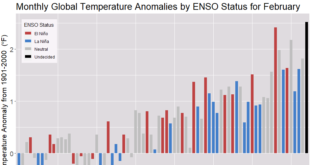
The Quanta Magazine article, A World Without Clouds A state-of-the-art supercomputer simulation indicates that a feedback loop between global warming and cloud loss can push Earth’s climate past a disastrous tipping point in as little as a century by Natalie Wolchover (2/25/19), reports on recent finding published in Nature Geoscience.
Clouds currently cover about two-thirds of the planet at any moment. But computer simulations of clouds have begun to suggest that as the Earth warms, clouds become scarcer. With fewer white surfaces reflecting sunlight back to space, the Earth gets even warmer, leading to more cloud loss. This feedback loop causes warming to spiral out of control.
The simulation revealed a tipping point: a level of warming at which stratocumulus clouds break up altogether. The disappearance occurs when the concentration of CO2 in the simulated atmosphere reaches 1,200 parts per million — a level that fossil fuel burning could push us past in about a century, under “business-as-usual” emissions scenarios. In the simulation, when the tipping point is breached, Earth’s temperature soars 8 degrees Celsius, in addition to the 4 degrees of warming or more caused by the CO2 directly.
There is evidence that this may have happened in the past:
More data points surfaced in China, then Europe, then all over. A picture emerged of a brief, cataclysmic hot spell 56 million years ago, now known as the Paleocene-Eocene Thermal Maximum (PETM). After heat-trapping carbon leaked into the sky from an unknown source, the planet, which was already several degrees Celsius hotter than it is today, gained an additional 6 degrees.
Related posts on feedback loops:
How are beavers creating a climate feedback loop?
Greenland Ice, Changing Albedo, and a Feedback Loop
Oceans as a Heat Sink: Possible Feedback Loop
A Feedback Loop: The Alaska Tundra
Methane Bubbles – A Feedback Loop
